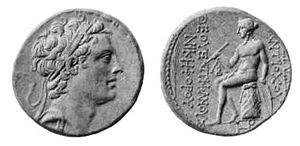Difference between revisions of "Antiochus IV Epiphanes" - New World Encyclopedia
(credit Wiki) |
(category) |
||
| Line 26: | Line 26: | ||
[[Category:Seleucid rulers|Antiochus 04]] | [[Category:Seleucid rulers|Antiochus 04]] | ||
[[Category:Ancient Jewish Greek history]] | [[Category:Ancient Jewish Greek history]] | ||
| − | + | [[Category:History and biography]] | |
[[de:Antiochos IV.]] | [[de:Antiochos IV.]] | ||
[[es:Antíoco IV Epífanes]] | [[es:Antíoco IV Epífanes]] | ||
Revision as of 21:10, 22 October 2005

Antiochus IV Epiphanes (Επιφανής, Greek: Manifest), originally named Mithradates, but renamed Antiochus either upon his ascension or after the death of his elder brother Antiochus (c. 215–163 B.C.E., reigned 175–163 B.C.E.), was one of the Seleucid emperors, son of Antiochus III the Great and brother of Seleucus IV Philopator.
Antiochus took power after the death of Seleucus Philopator. He had been hostage in Rome following the peace of Apamea in 188 B.C.E. but had recently been exchanged for the son and rightful heir of Seleucus IV, the later Demetrius I Soter. Taking advantage of this situation, Antiochus was able to proclaim himself as co-regent with another of Seleucus' sons, the infant Antiochus, whose murder he orchestrated a few years later.
Notable events during his reign include the near-conquest of Egypt, which was halted by the threat of Roman intervention, and the beginning of the Jewish revolt of the Maccabees. He was succeeded by his infant son, Antiochus V Eupator.
Because the guardians of Ptolemy VI of Egypt were demanding the return of Coele-Syria, Antiochus, in 170 B.C.E. decided on a preemptive strike and invaded Egypt, conquering all but Alexandria. He then captured Ptolemy agreed to let him continue as King but as his puppet. (This had the advantage of not alarming Rome.) Alexandria thereupon chose Ptolemy's brother Ptolemy Euergetes as King. In Antiochus' absence, the two brothers came to an agreement to rule jointly. Hence in 168 B.C.E. Antiochus again invaded and overran all Egypt but Alexandria while his fleet captured Cyprus. Near Alexandria he was met by a Roman envoy who told him that he must at once withdraw from Egypt and Cyprus. Antiochus said he would discuss it with his council, whereupon the envoy drew a line in the sand round him. Were he to step out of the circle, the envoy said, without having first undertaken to withdraw , he would be at war with Rome. Antiochus agreed to withdraw.
In a spirit of revenge he organized an expedition against Jerusalem, which he destroyed, as well as putting vast multitudes of its inhabitants to death in a most cruel manner. From this time the Jews began the war of independence under their Maccabean leaders with marked success, defeating the armies of Antiochus that were sent against them. Enraged at this, Antiochus is said to have marched against them in person, threatening utterly to exterminate the nation; but on the way he was suddenly arrested by the hand of death (164 B.C.E.). The exact causes of the Jewish revolt, and of Antiochus' response to it, are uncertain; the Jewish accounts are in the Books of Maccabees, and the successful revolt is commemorated by the holiday of Hanuka. His last years were spent on a campaign against the rising Parthian empire, which seems to have been initially successful but which terminated upon his death.
The reign of Antiochus was a last period of strength for the empire, but in some way it was fatal; because he was an usurper and left no successor except a little boy, his death was followed by devastating dynastic wars.
| Preceded by: Seleucus IV Philopator |
Seleucid King 175–163 B.C.E. |
Succeeded by: Antiochus V Eupator |
External link
de:Antiochos IV. es:Antíoco IV Epífanes fr:Antiochos IV he:אנטיוכוס הרביעי nl:Antiochus IV Epiphanes ja:アンティオコス4世エピファネス pl:Antioch IV Epifanes ru:Антиох IV Епифан fi:Antiokhos IV uk:Антіох IV zh:安条克四世
Credits
New World Encyclopedia writers and editors rewrote and completed the Wikipedia article in accordance with New World Encyclopedia standards. This article abides by terms of the Creative Commons CC-by-sa 3.0 License (CC-by-sa), which may be used and disseminated with proper attribution. Credit is due under the terms of this license that can reference both the New World Encyclopedia contributors and the selfless volunteer contributors of the Wikimedia Foundation. To cite this article click here for a list of acceptable citing formats.The history of earlier contributions by wikipedians is accessible to researchers here:
The history of this article since it was imported to New World Encyclopedia:
Note: Some restrictions may apply to use of individual images which are separately licensed.